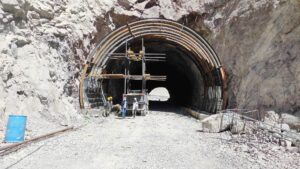- Ladakh’s First-ever tunnel set for completion in Nov
 Yash Khajuria
Yash Khajuria
Leh, Sept 11: In a landmark development aimed at strengthening India’s strategic and civilian infrastructure in Ladakh, the Border Roads Organisation (BRO) is on the brink of completing the first-ever tunnel along the Khalsar-Agham-Shyok road in eastern Ladakh. Spanning 140 meters and located at an altitude of 11,000 feet, the tunnel is set to provide crucial all-weather connectivity in one of India’s most remote and inhospitable regions.
The tunnel, being constructed under BRO’s Project HIMANK, is supervised by the 111 Road Construction Company (RCC) and the 753 Border Roads Task Force (BRTF). Despite daunting challenges, such as sub-zero temperatures, unpredictable terrain, and landslide-prone zones, the project is advancing at an impressive pace.
“The construction work is in full swing and the project is likely to be completed by November,” a senior official associated with Project HIMANK told The Earth News, Ladakh. “This region presents unique challenges—extreme weather, unstable geological conditions, and difficult terrain. But our team is committed to completing this project because we understand the immense strategic and civilian significance it holds, both for the military and the people of Ladakh.”
Once completed, the tunnel will serve as a vital link along the Khalsar-Agham-Shyok road, drastically reducing travel time and enhancing access to eastern Ladakh, a region of immense strategic importance. The tunnel’s ability to provide year-round connectivity will be especially valuable during the winter months, when snow and ice block numerous roads, leaving many areas isolated.
For the Indian military, which has a heavy presence in Ladakh due to the region’s proximity to the Line of Actual Control (LAC) with China, the tunnel will enhance logistical capabilities and allow for faster troop movements. This development is especially significant given the region’s challenging weather conditions and sensitive geopolitical environment.
Beyond its strategic benefits, the tunnel is expected to be a game-changer for the local population, who have long struggled with isolation due to the harsh terrain and lack of reliable road networks. The new tunnel will significantly reduce travel times, improving access to essential services, such as healthcare and education, and making it easier for locals to engage in trade and tourism.
“For too long, the people of Ladakh have faced hardships due to impassable roads. This project will change that,” the HIMANK official added. “It’s not just about military mobility; it’s about connecting communities and providing new economic opportunities.”
Improved connectivity will also lower transportation costs, giving a much-needed boost to local businesses and tourism, a sector with immense potential in Ladakh’s rugged but stunning landscape. The region has seen a steady increase in tourist footfall, and the tunnel is expected to further bolster this growth by making the area more accessible year-round.
BRO engineers have faced numerous challenges throughout the project, from battling extreme weather to navigating landslide-prone areas and working in a highly unstable geological environment. However, using cutting-edge technology and innovative construction techniques, they have managed to keep the project on track.
Landslides and avalanches are frequent in this region, often disrupting construction activities. Yet, with advanced engineering solutions, BRO has been able to make rapid progress, overcoming each obstacle as it arises. The tunnel’s nearing completion is a testament to the dedication and skill of the engineers involved.
With the tunnel expected to be operational soon, India is set to make a significant leap in its strategic preparedness. The ability to maintain uninterrupted connectivity in eastern Ladakh will not only strengthen the nation’s defense capabilities but also contribute to the region’s socio-economic development.
The tunnel along the Khalsar-Agham-Shyok road represents a key milestone in India’s broader efforts to modernize infrastructure in its northernmost regions, providing a lifeline for both military and civilian purposes. As this vital project nears completion, it marks a new chapter in the connectivity of Ladakh, a region that will soon experience the dual benefits of increased security and economic prosperity.



